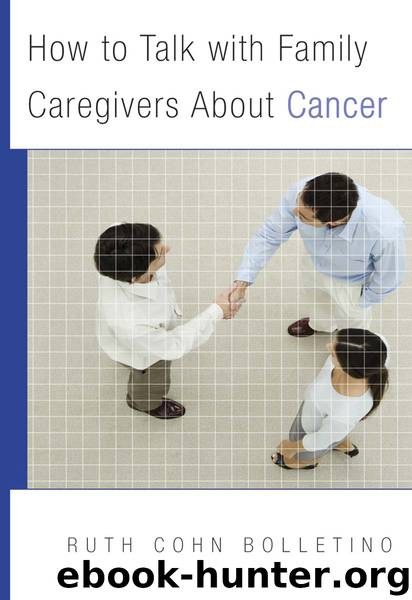How to Talk with Family Caregivers About Cancer by Ruth Bolletino

Author:Ruth Bolletino
Language: eng
Format: epub
Publisher: W. W. Norton & Company
Published: 2009-05-05T16:00:00+00:00
Gathering Information About the Diagnosis
Whether cancer is discovered during a routine physical examination or when the patient has consulted the primary physician or an internist after experiencing symptoms, it is this doctor who takes responsibility for the diagnosis. The physician might refer the patient to an oncologist, a physician specializing in cancer treatment, or a surgeon. Different oncologists specialize in treating different kinds of cancer. Surgical oncologists specialize in surgery, medical oncologists in chemotherapy treatments, and radiation oncologists in radiation treatments.
More than one test procedure might be necessary, so it might take days or even weeks to get the final diagnosis. During that time, the patient and family often go back and forth between the anxiety of waiting to learn the test results and the feeling that they don’t want to know. This is the beginning of their experience of living with not knowing what is going to happen, perhaps one of the most difficult places for anyone to be.
News of the diagnosis usually comes from the primary physician who receives the test results. It is difficult to imagine anyone who does not react with shock and fear, along with other typical reactions (described in chapters 1 and 8). However, despite these responses, it is essential that the patient seek medical information and help. People diagnosed with cancer who reject the diagnosis—for example, by refusing to believe it, by not talking about it, by not seeking medical help, by refusing medical treatment, or by seeking out questionable practitioners or treatments—are needlessly putting their lives in great danger.
At this time, or during another appointment soon afterward, the patient and family members need to obtain basic information. Clearly, the more information the family has about the patient’s specific kind of cancer, the more control they can take. (General information about cancer and diagnoses can be found in Appendix 1.)
Family members can be of enormous help by gathering information about the patient’s condition from the doctor, from books and articles, and from the Internet. Many Internet sites provide cancer information, but not all the information on the Web is safe and trustworthy. The most credible are those sponsored by health organizations such as the American Cancer Society, by the government, and by major medical institutions such as Harvard, Stanford, the Mayo Clinic, and Johns Hopkins University.
From the physician, patients and family members need the following information about test results and diagnoses:
Download
This site does not store any files on its server. We only index and link to content provided by other sites. Please contact the content providers to delete copyright contents if any and email us, we'll remove relevant links or contents immediately.
Good by S. Walden(3548)
The Social Psychology of Inequality by Unknown(3019)
The Checklist Manifesto by Atul Gawande(2848)
0041152001443424520 .pdf by Unknown(2843)
Get What's Yours for Medicare: Maximize Your Coverage, Minimize Your Costs by Philip Moeller(2643)
The Meaning of the Library by unknow(2565)
Guns, Germs and Steel by Diamond Jared(2366)
Borders by unknow(2304)
23:27 by H. L. Roberts(2248)
And the Band Played On by Randy Shilts(2199)
Being Mortal: Medicine and What Matters in the End by Atul Gawande(2122)
A Leg to Stand On by Oliver Sacks(2033)
The Hot Zone by Richard Preston(2013)
More Than Words (Sweet Lady Kisses) by Helen West(1860)
The Valachi Papers by Peter Maas(1847)
The Laws of Medicine by Siddhartha Mukherjee(1798)
The Andromeda Strain by Michael Crichton(1742)
Get What's Yours for Medicare by Philip Moeller(1690)
The Obesity Epidemic by Robyn Toomath(1673)
